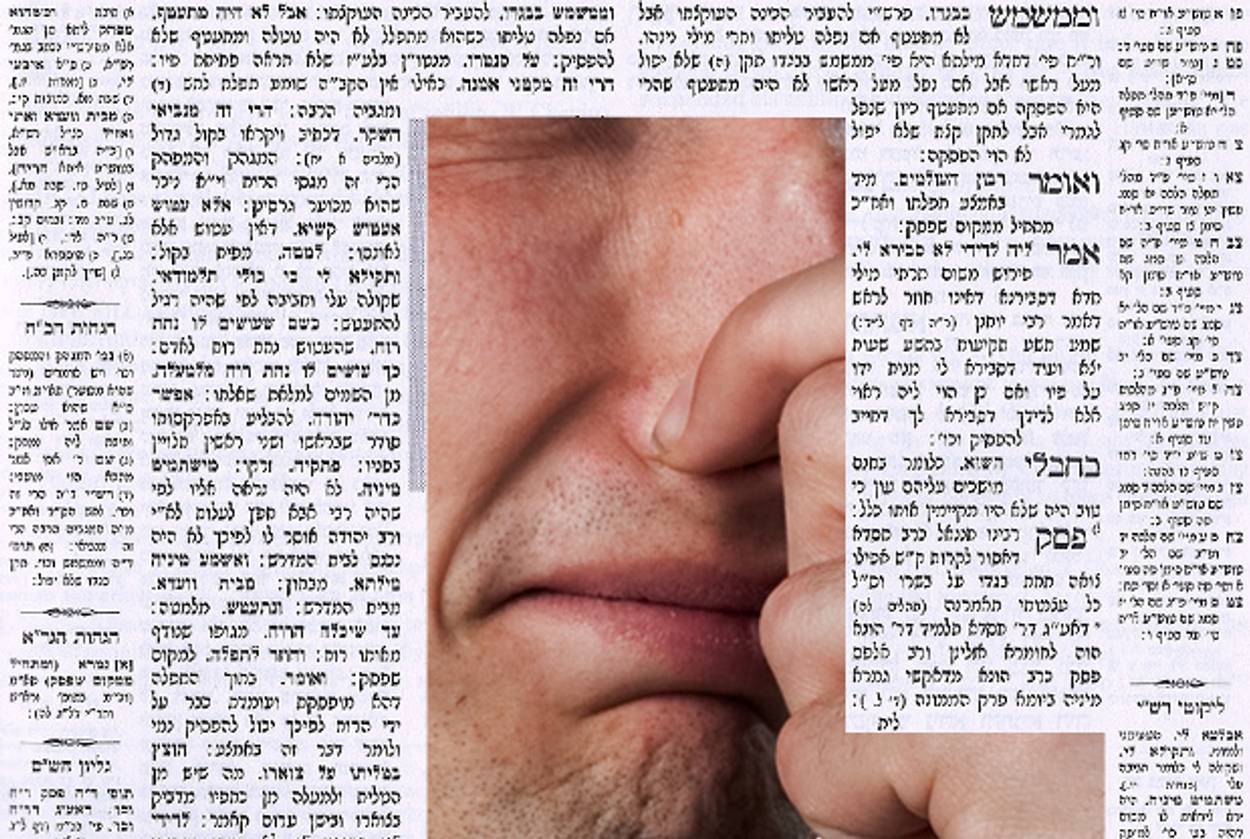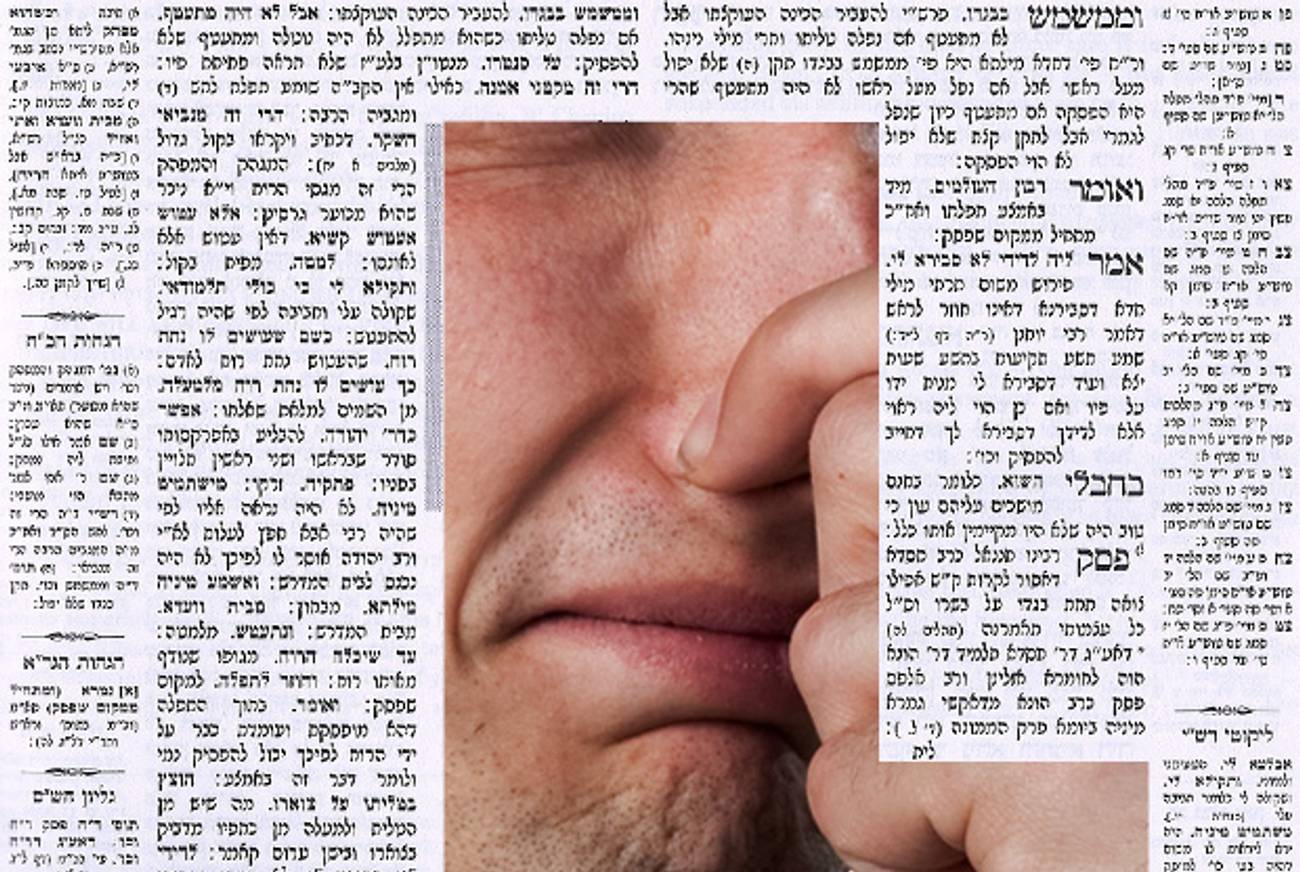Let’s Get Physical
In this week’s Talmud reading, the soul addresses God, but the body has its own agenda




Literary critic Adam Kirsch is reading a page of Talmud a day, along with Jews around the world.
“Master of the Universe, You formed us with openings upon openings and cavities upon cavities. It is revealed and known before you, our shame and humiliation during our lives, and at our end, worms and maggots await us.” These are the words that—according to a baraita cited in Berachot 24b, in this week’s Daf Yomi study—you are supposed to recite if you pass gas while praying. The very existence of such a formula seems odd at first, and perhaps a bit comic. But reading the Talmud this week was a lesson in how little the rabbis shared our kind of embarrassment before the body. All kinds of things that we are taught not to discuss in polite society were debated quite matter-of-factly in this week’s reading: semen, urine, feces, flatulence. The rabbis’ attitude toward all of them is well expressed in the words of the above prayer: God made us with openings and cavities, and it is up to us to find out a way to live decently with them. The condition of embodiment is not something to celebrate, since it is linked with humiliation and death; but neither is it fundamentally unnatural, a case of a soul trapped in the prison of the body.
It makes sense that these kinds of issues should come up in the tractate devoted to prayer, since prayer is the moment at which the tension between body and soul becomes most acute. The soul is addressing God, but the body has its own agenda—as the rabbis acknowledge in discussing the case of Judah HaNasi, also called Rebbi. While praying, Rabbi Chanina testified, Rebbi belched, yawned, sneezed, spat, and handled his garment.
This testimony presents a problem, not because of the apparent insult to Rebbi’s dignity, but for a reason that, in Talmudic terms, is far more serious: It raises a contradiction in the sources. It is assumed that Judah HaNasi—the editor of the Mishnah and its authoritative voice—would not do anything contrary to the law. Yet the Gemara goes on to cite a baraita holding that yawning, sneezing, and spitting during prayer are serious offenses. How to reconcile the law with Rebbi’s practice?
This kind of problem of reconciliation is, I have already come to recognize, the bread and butter of the Gemara. Nothing is more characteristic of the pages I have read so far than the use of imagination and logic to bring apparently contradictory sources into harmony. In the case of Rebbi, the challenge is to reconcile his all-too-human behavior during prayer with the law that forbids it. Lo kashya, “There is no contradiction,” the Gemara triumphantly holds: The law must have been directed against yawning and belching deliberately, while what Rebbi did was unintentional and therefore innocent.
But, the rabbis go on to point out, this logic will not work when it comes to sneezes, for sneezes are always unintentional, yet the baraita still holds, “One who sneezes during his prayer, it is an evil omen for him.” How to solve this contradiction? Again, lo kashya: what Rebbi did was an ordinary sneeze, but what the law meant to forbid was a sneeze “from below”—that is, passing gas.
One may feel that there is something too easy about this redefinition of sneezing. After all, if the baraita meant to prohibit passing gas, why didn’t it just say so? This kind of objection occurs to me fairly regularly in reading the Talmud, when the seemingly plain sense of a text is reinterpreted to meet the necessity of an argument. But I am trying to think my way into the logic of the rabbis, and it seems to me the best way to do this is by challenging my own sense of probability. To me, thinking in a basically secular way, it is probable that a text means just what it says and improbable that it could mean something different. By the same token, it strikes me as quite probable that Judah HaNasi could have sneezed during prayer, thereby breaking a law; after all, he too was only human, and if he did sneeze he probably repented for it afterward.
But this way of thinking about probability is ruled out by what seem to be the first principles of the rabbis. For these men, what seemed most improbable of all is that a holy man could have broken a law. It is far more probable that the law said something different than what it appears to say. The hierarchy of likelihoods is reversed, and that is why the rabbis seize on the possibility of redefining sneezing as “sneezing from below.”
But they implicitly recognize that this is something of a stretch, which is why they go on to bring another piece of supporting evidence. Rav Zeira cites an opinion he was taught, which holds that sneezing during prayer is actually a good omen: “For just as [sneezes] give him satisfaction below, in this world, so do they give him satisfaction above, in Heaven.” (The antinomian possibilities opened up by this saying are fearful, but the rabbis do not pursue them.) Now the balance of authorities with regard to sneezing is neutral: One is for it, the other against it. In these circumstances, it becomes more probable than ever that sneezing itself is not prohibited—which means that sneezing as the baraita used the term must actually mean passing gas.
A similar problem comes up a bit earlier, in Berachot 24a, with regard to the proper handling of tefillin. After a long discussion of how to treat tefillin in various situations—when entering a latrine, while sleeping—Rabbi Chanina once again testifies to a dubious practice of Rebbi’s: “I saw Rebbi suspend his tefillin from a peg.” This seems to fly in the face of another prohibition that states: “One who suspends his tefillin, his life will be suspended.” How to solve this contradiction? In this case, the rabbis focus on the ambiguity of the word “suspend.” It is forbidden to suspend tefillin by the strap; but what Rebbi must have done was to suspend them by their pouch. This feels like a convincing answer: After all, it does seem more impious to drape the strap of your tefillin over a peg than to put it in a pouch and hang the pouch from a peg.
This way of discussing points of law by observing the practice of the great rabbis gives the Talmud a vividness and humanity you might not expect from a law code. In addition to preserving the opinions of the rabbis, the Talmud preserves flashes of their behavior and even their personalities. (At least twice so far, rabbis have explained their deviation from ordinary ritual practice by saying that they were “delicate people”; it is hard not to feel warmly toward a legal system that allows this as a formal excuse.) Even at its most abstract, the Talmud reminds you that it is rooted in the behavior and beliefs of real individuals with real bodies, refractory and inescapable as our own.
***
Like this article? Sign up for our Daily Digest to get Tablet Magazine’s new content in your inbox each morning.
Adam Kirsch is a poet and literary critic, whose books include The People and the Books: 18 Classics of Jewish Literature.
Adam Kirsch is a poet and literary critic, whose books include The People and the Books: 18 Classics of Jewish Literature.